Cardiovascular training versus resistance training for fatigue in people with cancer
- PMID: 39229865
- PMCID: PMC11372854
- DOI: 10.1002/14651858.CD015519.pub2
Cardiovascular training versus resistance training for fatigue in people with cancer
Abstract
Background: With prevalence estimates between 50% and 90% of people with cancer, cancer-related fatigue is one of the most common morbidities related to cancer and its treatment. Exercise is beneficial for the treatment of cancer-related fatigue. However, the efficacy of different types of exercise (i.e. cardiovascular training and resistance training) have not yet been investigated systematically and compared directly in a meta-analysis.
Objectives: To compare the benefits and harms of cardiovascular training versus resistance training for treatment or prevention of cancer-related fatigue in people with cancer.
Search methods: We searched CENTRAL, MEDLINE, Embase, and five other databases in January 2023. We searched ClinicalTrials.gov and the International Clinical Trials Registry Platform for ongoing trials. We integrated results from update searches of previously published Cochrane reviews. In total, our searches included trials from inception to October 2023.
Selection criteria: We included randomised controlled trials investigating cardiovascular training compared with resistance training, with exercise as the main component. We included studies on adults with cancer (aged 18 years and older), with or without a diagnosis of cancer-related fatigue, for any type of cancer and any type of cancer treatment, with the intervention starting before, during, or after treatment. We included trials evaluating at least one of our primary outcomes (cancer-related fatigue or quality of life). We excluded combined cardiovascular and resistance interventions, yoga, and mindfulness-based interventions. Our primary outcomes were cancer-related fatigue and quality of life. Our secondary outcomes were adverse events, anxiety, and depression.
Data collection and analysis: We used standard Cochrane methodology. For analyses, we pooled results within the same period of outcome assessment (i.e. short term (up to and including 12 weeks' follow-up), medium term (more than 12 weeks' to less than six months' follow-up), and long term (six months' follow-up or longer)). We assessed risk of bias using the Cochrane RoB 1 tool, and certainty of the evidence using GRADE.
Main results: We included six studies with 447 participants with prostate, breast, or lung cancer who received radiotherapy or chemotherapy, had surgery, or a combination of these. All studies had a high risk of bias due to lack of blinding. Three studies had an additional high risk of bias domain; one study for attrition bias, and two studies for selection bias. Interventions in the cardiovascular training groups included training on a cycle ergometer, treadmill, an elliptical trainer, or indoor bike. Interventions in the resistance training group included a varying number of exercises using bodyweight, weights, or resistance bands. Interventions varied in frequency, intensity, and duration. None of the included studies reported including participants with a confirmed cancer-related fatigue diagnosis. The interventions in four studies started during cancer treatment and in two studies after cancer treatment. Before treatment No studies reported interventions starting before cancer treatment. During treatment The evidence was very uncertain about the effect of cardiovascular training compared with resistance training for short-term cancer-related fatigue (mean difference (MD) -0.29, 95% confidence interval (CI) -2.52 to 1.84; 4 studies, 311 participants; Functional Assessment of Chronic Illness Therapy - Fatigue (FACIT-Fatigue) scale where higher values indicate better outcome; very low-certainty evidence) and long-term cancer-related fatigue (MD 1.30, 95% CI -2.17 to 4.77; 1 study, 141 participants; FACIT-Fatigue scale; very low-certainty evidence). The evidence was very uncertain about the effect of cardiovascular training compared with resistance training for short-term quality of life (MD 1.47, 95% CI -1.47 to 4.42; 4 studies, 319 participants; Functional Assessment of Cancer Therapy - General scale where higher values indicate better outcome; very low-certainty evidence) and for long-term quality of life (MD 3.40, 95% CI -4.85 to 11.65; 1 study, 141 participants; Functional Assessment of Cancer Therapy - Anemia scale where higher values indicate better outcome; very low-certainty evidence). The evidence is very uncertain about the effect of cardiovascular training compared with resistance training on the occurrence of adverse events at any follow-up (risk ratio (RR) 2.00, 95% CI 0.19 to 21.18; 2 studies, 128 participants; very low-certainty evidence). No studies reported medium-term cancer-related fatigue or quality of life. After treatment The evidence was very uncertain about the effect of cardiovascular training compared with resistance training for short-term cancer-related fatigue (MD 1.47, 95% CI -0.09 to 3.03; 1 study, 95 participants; Multidimensional Fatigue Inventory-20 General Fatigue subscale where higher values indicate worse outcome; very low-certainty evidence). Resistance training may improve short-term quality of life compared to cardiovascular training, but the evidence is very uncertain (MD -10.96, 95% CI -17.77 to -4.15; 1 study, 95 participants; European Organisation for Research and Treatment of Cancer Quality of Life Questionnaire-C30 Global Health subscale where higher values indicate better outcome; very low-certainty evidence). No studies reported outcomes at medium-term or long-term follow-up.
Authors' conclusions: The evidence is very uncertain about the effects of cardiovascular training compared with resistance training on treatment of cancer-related fatigue in people with cancer. Larger, well-conducted studies including people with different cancer types receiving different treatments are needed to increase the certainty in the evidence and to better understand who may benefit most from cardiovascular or resistance training. Moreover, studies comparing the effects of cardiovascular and resistance training initiated before as well as after cancer treatment are needed to understand the prophylactic and rehabilitative effects of these exercise types on cancer-related fatigue.
Copyright © 2024 The Cochrane Collaboration. Published by John Wiley & Sons, Ltd.
Conflict of interest statement
AO: none. They are a Cochrane Editor, but were not involved in the editorial process of this review.
SM: none. They are a Cochrane Editor, but were not involved in the editorial process of this review.
CW: none. They are a Cochrane Editor, but were not involved in the editorial process of this review.
AW: none.
NC: none. They are a Cochrane Editor, but were not involved in the editorial process of this review.
PB: reports consultancy fees and travel expenses from BeiGene, Bristol‐Myers Squibb, Celgene, MSD, Stemline and Takeda Oncology; paid to himself.
UH: none.
FB: none.
JW: none. They were involved in the BENEFIT study (currently in follow‐up; study awaiting classification in this review; NCT02999074) and the TOP study (included in this review, Pelzer 2023), but was not involved in the data extraction, risk of bias assessment, or analysis in this review.
IM: none. She is an Information Specialist of Cochrane Haematology and a Cochrane Editor, but was not involved in the editorial process of this review.
RWS: none. They are a Cochrane Editor, but were not involved in the editorial process of this review.
SIM: none.
ME: none. They are a Cochrane Editor, but were not involved in the editorial process of this review.
NS: none. She is Co‐ordinating Editor of Cochrane Haematology but was not involved in the editorial process of this review.
Figures


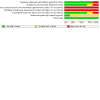
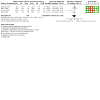
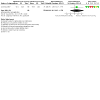
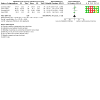
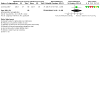
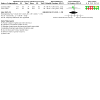
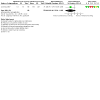
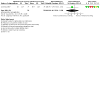
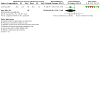
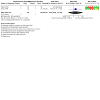
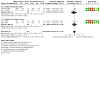
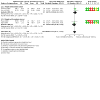
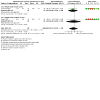
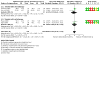
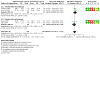
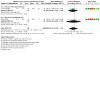
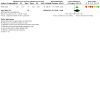
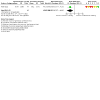
Update of
References
References to studies included in this review
Courneya 2007 {published data only}
-
- Adams SC, Segal RJ, McKenzie CD, Vallerand JR, Morielli AR, Mackey JR, et al. Impact of resistance and aerobic exercise on sarcopenia and dynapenia in breast cancer patients receiving adjuvant chemotherapy: a multicenter randomized controlled trial. Breast Cancer Research and Treatment 2016;158:497-507. [DOI: 10.1007/s10549-016-3900-2] - DOI - PubMed
-
- Courneya KS, Friedenreich CM, Reid RD, Gelmon K, Mackey JR, Ladha AB, et al. Predictors of follow-up exercise behavior 6 months after a randomized trial of exercise training during breast cancer chemotherapy. Breast Cancer Research and Treatment 2009;114(1):179-87. [DOI: 10.1007/s10549-008-9987-3] - DOI - PubMed
Pelzer 2023 {published data only}
-
- NCT02883699. Individually tailored training prescriptions in cancer patients: the TOP Study (TOP). clinicaltrials.gov/ct2/show/NCT02883699 (first posted 30 August 2016). [CLINICALTRIALS.GOV: NCT02883699]
Piraux 2020 {published data only}
-
- Piraux E, Caty G, Renard L, Vancraeynest D, Tombal B, Geets X, et al. Effects of high-intensity interval training compared with resistance training in prostate cancer patients undergoing radiotherapy: a randomized controlled trial. Prostate Cancer and Prostatic Diseases 2020;24:156-65. [DOI: 10.1038/s41391-020-0259-6] - DOI - PubMed
Schmidt 2015 {published data only}
-
- Schmidt T, Weisser B, Dürkop J, Jonat W, Van Mackelenbergh M, Röcken C, et al. Comparing endurance and resistance training with standard care during chemotherapy for patients with primary breast cancer. Anticancer Research 2015;35(10):5623-9. - PubMed
Scott 2021 {published data only (unpublished sought but not used)}
-
- Jones LW, Eves ND, Kraus WE, Potti A, Crawford J, Blumenthal JA, et al. The lung cancer exercise training study: a randomized trial of aerobic training, resistance training, or both in postsurgical lung cancer patients: rationale and design. BioMed Central 2010;10:155. [DOI: 10.1186/1471-2407-10-155] [PMID: ] - DOI - PMC - PubMed
-
- Scott JM, Thomas SM, Herndon JE, Douglas PS, Yu AF, Rusch V, et al. Effects and tolerability of exercise therapy modality on cardiorespiratory fitness in lung cancer: a randomized controlled trial. Journal of Cachexia, Sarcopenia and Muscle 2021;12(6):1456-65. [DOI: 10.1002/jcsm.12828] - DOI - PMC - PubMed
Segal 2009 {published data only}
References to studies excluded from this review
Ajjou 2021 {published data only}
-
- Ajjou MN, Bastarache G, Walsh E, Routy B, Blais N, Tehfe M, et al. High intensity interval training safety and efficacy in patients with advanced NSCLC receiving systemic treatment: results of a prospective trial. Journal of Clinical Oncology 2021;39(15):12054. [PMID: 10.1200/JCO.2021.39.15_suppl.12054] - DOI
Andhare 2020 {published data only}
-
- Andhare NM, Yeole UL, Varde F. Effect of physiotherapeutic exercises on fatigue and quality of life in cancer patients. Indian Journal of Public Health Research and Development 2020;11(6):538-42.
Cohen 2021 {published data only}
Demmelmaier 2021 {published data only}
-
- Demmelmaier I, Brooke HL, Henriksson A, Mazzoni AS, Bjørke AC, Igelström H. Does exercise intensity matter for fatigue during (neo-)adjuvant cancer treatment? The Phys-Can randomised clinical trial. Scandinavian Journal of Medicine & in Sports 2021;31(4):1144-59. [DOI: 10.1111/sms.13930] - DOI - PubMed
Devin 2016 {published data only}
-
- Devin JL, Sax AT, Hughes GI, Jenkins DG, Aitken JF, Chambers SK, et al. The influence of high-intensity compared with moderate-intensity exercise training on cardiorespiratory fitness and body composition in colorectal cancer survivors: a randomised controlled trial. Journal of Cancer Survivorship 2016;10(3):467-79. [DOI: 10.1007/s11764-015-0490-7] - DOI - PubMed
EXIT Kirkham 2020 {published data only}
Heim 2007 {published data only}
Hong 2020 {published data only}
Khan 2018 {published data only}
-
- Khan S, Agrawal R, Shaikh S, Thakur N. Comparison of effect of aerobic training versus resistance training on cancer-related fatigue and quality of life in breast cancer survivors. Indian Journal of Public Health Research and Development 2018;11(7):893-9.
McNeely 2008 {published data only}
-
- McNeely ML. Exercise rehabilitation for breast and head and neck cancer survivors. Dissertation Abstracts International: Section B: The Sciences and Engineering 2008;68(10-B):6627.
Pagola 2020 {published data only}
Pahl 2020 {published data only}
Paulo 2019 {published data only}
-
- Paulo TR, Rossi FE, Viezel J, Tosello GT, Seidinger SC, Simões RR. The impact of an exercise program on quality of life in older breast cancer survivors undergoing aromatase inhibitor therapy: a randomized controlled trial. Health and Quality of Life Outcomes 2019;17(1):1-12. [DOI: 10.1186/s12955-019-1090-4] - DOI - PMC - PubMed
Poier 2019 {published data only}
Rogers 2009 {published data only}
-
- Rogers LQ, Hopkins-Price P, Vicari S, Markwell S, Pamenter R, Courneya RS, et al. Physical activity and health outcomes three months after completing a physical activity behavior change intervention: persistent and delayed effects. Cancer Epidemiology, Biomarkers & Prevention 2009;18(5):1410-8. [DOI: 10.1158/1055-9965.EPI-08-1045] - DOI - PubMed
Santagnello 2020 {published data only}
-
- Santagnello SB, Maria Martins F, Nascimento de Oliveira Junior G, Freitas Rodrigues de Sousa J, Simões Nomelini R, Candido Murta EF, et al. Improvements in muscle strength, power, and size and self-reported fatigue as mediators of the effect of resistance exercise on physical performance breast cancer survivor women: a randomized controlled trial. Supportive Care in Cancer 2020;28(12):6075-84. [DOI: 10.1007/s00520-020-05429-6] - DOI - PubMed
Segar 1998 {published data only}
-
- Segar ML, Katch VL, Roth RS, Garcia AW, Portner TI, Glickman SG, et al. The effect of aerobic exercise on self-esteem and depressive and anxiety symptoms among breast cancer survivors. Oncology Nursing Forum 1998;25(1):107-13. [PMID: ] - PubMed
Viamonte 2023 {published data only}
-
- Viamonte SG, Joaquim AV, Alves A, Vilela E, Capela A, Ferreira C. Impact of a COmprehensive cardiac REhabilitation framework among high cardiovascular risk cancer survivors: protocol for the CORE trial. International Journal of Cardiology 2023;371:384-90. [DOI: 10.1016/j.ijcard.2022.09.075] - DOI - PubMed
References to studies awaiting assessment
NCT02999074 {published data only}
-
- NCT02999074. Exercise interventions for breast cancer patients undergoing neoadjuvant chemotherapy (BENEFIT). clinicaltrials.gov/ct2/show/NCT02999074 (first posted 21 December 2016). [CLINICALTRIALS.GOV: NCT02999074]
NCT04656457 {published data only}
-
- NCT04656457. Resistance versus aerobic exercises on breast cancer patients. clinicaltrials.gov/ct2/show/NCT04656457 (first posted 7 December 2020). [CLINICALTRIALS.GOV: NCT04656457]
Rufa'i 2016 {published data only}
References to ongoing studies
NCT05297773 {published data only}
-
- NCT05297773. Resistance vs. aerobic training on breast cancer patients undergoing neoadjuvant treatment (NEO-Program). clinicaltrials.gov/ct2/show/NCT05297773 (first posted 28 March 2022). [CLINICALTRIALS.GOV: NCT05297773]
Additional references
Abrahams 2018
Agudelo 2014
Al‐Majid 2009
-
- Al-Majid S, Gray DP. A biobehavioral model for the study of exercise interventions in cancer-related fatigue. Biological Research for Nursing 2009;10(4):381-91. [DOI: ] - PubMed
Aldiss 2019
Baguley 2017
Beck 1996
-
- Beck AT, Steer RA, Brown G. Beck Depression Inventory–II (Database record). American Psychological Association PsycTests. [DOI: 10.1037/t00742-000] - DOI
Belloni 2021
Bower 2014
Buffart 2014
Bull 2020
Campbell 2012
Campbell 2019
-
- Campbell KL, Winters-Stone KM, Wiskemann J, May AM, Schwartz AL, Courneya KS, et al. Exercise guidelines for cancer survivors: consensus statement from international multidisciplinary roundtable. Medicine and Science in Sports and Exercise 2019;51(11):2375-90. [DOI: 10.1249/MSS.0000000000002116] - DOI - PMC - PubMed
Campos 2011
Cella 1993
-
- Cella DF, Tulsky DS, Gray G, Sarafian B, Linn E, Bonomi A, et al. The Functional Assessment of Cancer Therapy scale: development and validation of the general measure. Journal of Clinical Oncology 1993;11(3):570-9. - PubMed
Cella 1995
Cella 1997
-
- Cella D. The Functional Assessment of Cancer Therapy – Anemia (FACT-An) scale: a new tool for the assessment of outcomes in cancer anemia and fatigue. Seminars in Hematology 1997;34(3):13-9. [PMID: ] - PubMed
Cella 2002
-
- Cella D, Eton DT, Lai JS, Peterman AH, Merkel DE. Combining anchor and distribution-based methods to derive minimal clinically important differences on the Functional Assessment of Cancer Therapy (FACT) Anemia and Fatigue scales. Journal of Pain and Symptom Management 2002;24(6):547-61. [DOI: 10.1016/s0885-3924(02)00529-8] - DOI - PubMed
Cleeland 2013
-
- Cleeland CS, Zhao F, Chang VT, Sloan JA, O'Mara AM, Gilman PB, et al. The symptom burden of cancer: evidence for a core set of cancer-related and treatment-related symptoms from the Eastern Cooperative Oncology Group Symptom Outcomes and Practice Patterns study. Cancer 2013;119(24):4333-40. - PMC - PubMed
Codima 2021
Cramp 2012
Deeks 2022
-
- Deeks JJ, Higgins JP, Altman DG, editor(s). Chapter 10: analysing data and undertaking meta-analyses. In: Higgins JP, Thomas J, Chandler J, Cumpston M, Li T, Page MJ, Welch VA, editor(s). Cochrane Handbook for Systematic Reviews of Interventions Version 6.3 (updated February 2022). Cochrane, 2022. Available from training.cochrane.org/handbook/archive/v6.3.
Fabi 2020
Fayers 2002
Furukawa 2006
Garber 2011
-
- Garber CE, Blissmer B, Deschenes MR, Franklin BA, Lamonte MJ, Lee I, et al. Quantity and quality of exercise for developing and maintaining cardiorespiratory, musculoskeletal, and neuromotor fitness in apparently healthy adults: Guidance for prescribing exercise. Medicine and Science in Sports and Exercise 2011;43(7):1334-59. [DOI: 10.1249/MSS.0b013e318213fefb] - DOI - PubMed
Gascón 2018
GRADEpro GDT [Computer program]
-
- GRADEpro GDT. Version accessed prior to 15 February 2022. Hamilton (ON): McMaster University (developed by Evidence Prime), 2022. https://www.gradepro.org.
Groenvold 2007
Gupta 2007
Haase 2022
Hagstrom 2016
-
- Hagstrom AD, Marshall PW, Lonsdale C, Cheema BS, Flatarone Singh MA, Green S. Resistance training improves fatigue and quality of life in previously sedentary breast cancer survivors: a randomised controlled trial. European Journal of Cancer Care 2016;25(5):784-94. [DOI: 10.1111/ecc.12422] - DOI - PubMed
Hautzinger 1988
-
- Hautzinger M. The CES-D scale: a depression-rating scale for research in the general population [Die CES-D Skala: ein Depressionsmessinstrument für Untersuchungen in der Allgemeinbevölkerung]. Diagnostica 1988;34(2):167-73.
Hayes 2019
Higgins 2011
Higgins 2023a
-
- Higgins JP, Eldridge S, Li T, editor(s). Chapter 23: Including variants on randomized trials. In: Higgins JP, Thomas J, Chandler J, Cumpston M, Li T, Page MJ, Welch VA, editor(s). Cochrane Handbook for Systematic Reviews of Interventions Version 6.4 (updated August 2023). Available from training.cochrane.org/handbook.
Higgins 2023b
-
- Higgins JP, Thomas J, Chandler J, Cumpston M, Li T, Page MJ, Welch VA, editor(s). Cochrane Handbook for Systematic Reviews of Interventions Version 6.4 (updated August 2023). Cochrane, 2023. Available from training.cochrane.org/handbook.
Higgins 2023c
-
- Higgins JP, Savović J, Page MJ, Elbers RG, Sterne JA. Chapter 8: Assessing risk of bias in a randomized trial. In: Higgins JP, Thomas J, Chandler J, Cumpston M, Li T, Page MJ, Welch VA, editor(s). Cochrane Handbook for Systematic Reviews of Interventions Version 6.4 (updated August 2023). Cochrane, 2023. Available from www.training.cochrane.org/handbook.
Hilfiker 2018
-
- Hilfiker R, Meichtry A, Eicher M, Nilsson Balfe L, Knols RH, Verra ML, et al. Exercise and other non-pharmaceutical interventions for cancer-related fatigue in patients during or after cancer treatment: a systematic review incorporating an indirect-comparisons meta-analysis. British Journal of Sports Medicine 2018;52(10):651. [DOI: 10.1136/bjsports-2016-096422] - DOI - PMC - PubMed
Hojan 2016
-
- Hojan K, Kwiatkowska-Borowczyk E, Leporowska E, Górecki M, Ozga-Majchrzak O, Milecki T, et al. Physical exercise for functional capacity, blood immune function, fatigue, and quality of life in high-risk prostate cancer patients during radiotherapy: a prospective, randomized clinical study. European Journal of Physical and Rehabilitation Medicine 2016;52(4):489-501. - PubMed
Hojman 2018
Khosravi 2019
Kim 2015
Kim 2022
Knips 2019
Kvaal 2005
LaVoy 2016
Ma 2020
McAuley 2010
McMillan 2011
Mendoza 1999
Mishra 2012a
-
- Mishra SI, Scherer RW, Snyder C, Geigle PM, Berlanstein DR, Topaloglu O. Exercise interventions on health-related quality of life for people with cancer during active treatment. Cochrane Database of Systematic Reviews 2012, Issue 8. Art. No: CD007566. [DOI: 10.1002/14651858.CD007566.pub2] - DOI - PMC - PubMed
Mishra 2012b
Musoro 2023
-
- Musoro JZ, Coens C, Sprangers MA, Brandberg Y, Groenvold M, Fletchner HH, et al. Minimally important differences for interpreting EORTC QLQ-C30 change scores over time: a synthesis across 21 clinical trials involving nine different cancer types. EJC 2023;188:171-82. [DOI: 10.1016/j.ejca.2023.04.027] - DOI - PubMed
Mustian 2008
-
- Mustian KM, Palesh O, Heckler CE, Roscoe JA, Morrow GR, Jacobs A, et al. Cancer-related fatigue interferes with activities of daily living among 753 patients receiving chemotherapy: a URCC CCOP study. Journal of Clinical Oncology 2008;26(15):9500. [DOI: 10.1200/jco.2008.26.15_suppl.9500] - DOI
NCCN 2022
-
- National Comprehensive Cancer Network (NCCN). NCCN clinical practice guidelines in oncology: cancer-related fatigue. www.nccn.org/professionals/physician_gls/pdf/fatigue.pdf (accessed prior to 17 February 2022).
Nordin 2016
O'Higgins 2018
Page 2023
-
- Page MJ, Higgins JP, Sterne JA. Chapter 13: Assessing risk of bias due to missing results in a synthesis. In: Higgins JP, Thomas J, Chandler J, Cumpston M, Li T, Page MJ, Welch VA, editor(s). Cochrane Handbook for Systematic Reviews of Interventions Version 6.4 (updated August 2023). Cochrane, 2023. Available from training.cochrane.org/handbook.
Phillips 2013
-
- Phillips KM, Pinilla-Ibarz J, Sotomayor E, Lee MR, Jim HS, Small BJ, et al. Quality of life outcomes in patients with chronic myeloid leukemia treated with tyrosine kinase inhibitors: a controlled comparison. Supportive Care in Cancer 2013;21(4):1097-103. [DOI: 10.1007/s00520-012-1630-5] - DOI - PubMed
Quinten 2011
Rendeiro 2021
RevMan 2022 [Computer program]
-
- Review Manager (RevMan). Version 4.1.0. The Cochrane Collaboration, 2022. Available at https://revman.cochrane.org.
Ripamonti 2018
Rock 2022
Roila 2019
-
- Roila F, Fumi G, Ruggeri B, Antonuzzo A, Ripamonti C, Fatigoni S, et al. Prevalence, characteristics, and treatment of fatigue in oncological cancer patients in Italy: a cross-sectional study of the Italian Network for Supportive Care in Cancer (NICSO). Supportive Care in Cancer 2019;27:1041-7. [DOI: 10.1007/s00520-018-4393-9] - DOI - PubMed
Ruiz‐Casado 2021
Schlittler 2016
-
- Schlittler M, Goiny M, Agudelo LZ, Venckunas T, Brazaitis M, Skurvydas A, et al. Endurance exercise increases skeletal muscle kynurenine aminotransferases and plasma kynurenic acid in humans. American Journal of Physiology - Cell Physiology 2016;310(10):836-40. [DOI: 10.1152/ajpcell.00053.2016] - DOI - PubMed
Schmidt 2020
Schmitz 2010
Schünemann 2023
-
- Schünemann HJ, Higgins JP, Vist GE, Glasziou P, Akl EA, Skoetz N, et al. Chapter 14: Completing 'Summary of findings' tables and grading the certainty of the evidence. In: Higgins JP, Thomas J, Chandler J, Cumpston M, Li T, Page MJ, Welch VA, editor(s). Cochrane Handbook for Systematic Reviews of Interventions Version 6.4 (updated August 2023). Cochrane, 2023. Available from training.cochrane.org/handbook.
Scott 2017
Segal 2003
Sharour 2020
Signal 2014
-
- Signal NE. Strength training after stroke: rationale, evidence and potential implementation barriers for physiotherapists. New Zealand Journal of Physiotherapy 2014;42(2):101-7.
Smets 1995
Smith 2019
-
- Smith TG, Troeschel AN, Castro KM, Arora NK, Stein K, Lipscomb J, et al. Perceptions of patients with breast and colon cancer of the management of cancer-related pain, fatigue, and emotional distress in community oncology. Journal of Clinical Oncology 2019;37(19):1666-76. [DOI: 10.1200/JCO.18.01579] - DOI - PMC - PubMed
Steindorf 2014
-
- Steindorf K, Schmidt ME, Klassen O, Ulrich CM, Oelmann J, Habermann N, et al. Randomized, controlled trial of resistance training in breast cancer patients receiving adjuvant radiotherapy: results on cancer-related fatigue and quality of life. Annals of Oncology 2014;25(11):2237-43. [DOI: 10.1093/annonc/mdu374] - DOI - PubMed
Thomsen 2024
Tian 2016
Wang 2014
Yang 2019
Yellen 1997
-
- Yellen SB, Cella DF, Webster K, Blendowski C, Kaplan E. Measuring fatigue and other anemia-related symptoms with the Functional Assessment of Cancer Therapy (FACT) measurement system. Journal of Pain and Symptom Management 1997;13(2):63-74. [DOI: 10.1016/s0885-3924(96)00274-6] [PMID: ] - DOI - PubMed
Zigmond 1983
Zou 2014
References to other published versions of this review
Ernst 2022
-
- Ernst M, Andreas M, Wagner C, Cryns N, Oeser A, Messer S, et al. Exercise for fatigue in people with cancer during and after active treatment. Cochrane Database of Systematic Reviews 2022, Issue 3. Art. No: CD015211. [DOI: 10.1002/14651858.CD015211] - DOI
Publication types
MeSH terms
LinkOut - more resources
Full Text Sources
Medical

